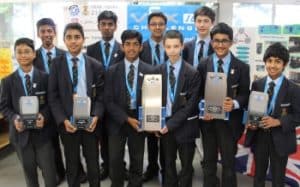
The Summer Term, and indeed the whole academic year, has been marked by a large number of visits to Queen Elizabeth’s School from speakers who are forging illustrious careers in their chosen fields. Many of them are alumni.
 For example, I was pleased to welcome Major Charles Russell as guest speaker on Founder’s Day and in this last week of term we are being joined by Daniel Isenberg, fulfilling a similar role at our Junior Awards Ceremony.
For example, I was pleased to welcome Major Charles Russell as guest speaker on Founder’s Day and in this last week of term we are being joined by Daniel Isenberg, fulfilling a similar role at our Junior Awards Ceremony.
We devote a great deal of time, effort and thought to enhancing pupils’ future prospects as they consider firstly their university choices and, ultimately, their careers. I urge boys to make full use of the opportunities afforded by visits from our old boys and others. It is important that boys and their parents are not over-hasty in planning career pathways. After all, there are an estimated 80,000 working hours in an average career, so one’s own wellbeing and happiness may depend on making the right decisions. 80,000 Hours is also the name of an organisation providing career advice for talented young people who want to have a social impact. It recently published long-term research identifying key elements that go into making a ‘dream job’ – one that is both enjoyable and meaningful. Interestingly, neither high pay nor low stress is among them. Instead, the researchers highlighted three factors which resonate very strongly with all that we are working to achieve at this School.
One is that the work involved must be sufficiently engaging to hold one’s attention. This typically means that tasks should be varied and have a clear beginning and end, that the person working has freedom to decide how he will carry out the work, and that he should receive feedback on it. All of this dovetails with the specific ways we deliver teaching and learning at QE. Pupils receive effective feedback and guidance through a bespoke approach that includes the setting and monitoring of personalised targets, our Personal Development Time programme, peer mentoring and subject clinics. And with our emphasis on the development of free-thinking scholarship, we ensure that Elizabethans can thrive in engaging workplace environments, having developed the effective habits of independent learning, resilience and academic curiosity that will make them a prized asset for employers.
 Another essential for true career satisfaction is that a job should be a good match for one’s ability. At QE, much of what we do to support boys in planning their futures focuses on helping them become aware of their own strengths. We provide extensive opportunities for boys to test their nascent career plans, whether that is: through our work experience programme; through contact with old boys in our fast-growing alumni network; through events such as this month’s Year 9 Careers Circus, or through extra-curricular activities such as the new Coding Club, the Bar Mock Trial competition and the Combined Cadet Force. Our success at the VEX IQ World Robotics Championships is a terrific example: while pupils got involved for the fun and intellectual challenge, there is clear scope for it to lead to career opportunities later in life.
Another essential for true career satisfaction is that a job should be a good match for one’s ability. At QE, much of what we do to support boys in planning their futures focuses on helping them become aware of their own strengths. We provide extensive opportunities for boys to test their nascent career plans, whether that is: through our work experience programme; through contact with old boys in our fast-growing alumni network; through events such as this month’s Year 9 Careers Circus, or through extra-curricular activities such as the new Coding Club, the Bar Mock Trial competition and the Combined Cadet Force. Our success at the VEX IQ World Robotics Championships is a terrific example: while pupils got involved for the fun and intellectual challenge, there is clear scope for it to lead to career opportunities later in life.
Finally, the researchers identified growing evidence that helping others is a key ingredient for fulfilment at work. Both Charlie Russell and Daniel Isenberg are prime exemplars of those who derive satisfaction from work that helps others. Now a rising young barrister, Daniel (OE 1999–2006) gained a Double First at Cambridge and was a Fast Stream Graduate with the Ministry of Defence before gaining an LLM from Harvard Law School. He has served with the Supreme Courts of both the UK and Israel, while in his spare time pursuing a love of rugby – he is an RFU-certified  referee – and working as a volunteer for the Samaritans. On Founder’s Day, Charlie (OE 1997–2004) spoke about his own successful career as a British Army officer, which was punctuated by an attack in Helmand Province, Afghanistan, in 2010, that caused him very serious injuries. In his speech, Charlie not only explored the centrality of service to the military profession, but highlighted the role of the concept at QE. As the sad story of our 1916 School Captain in the final article of this newsletter shows, traditions of service have long been associated with the School. Moreover, they remain at the heart of what we do today, enshrined in our commitment to “developing boys’ awareness that they achieve genuine fulfilment and greater benefit by seeking to make a contribution to society rather than pursuing only personal gain”.
referee – and working as a volunteer for the Samaritans. On Founder’s Day, Charlie (OE 1997–2004) spoke about his own successful career as a British Army officer, which was punctuated by an attack in Helmand Province, Afghanistan, in 2010, that caused him very serious injuries. In his speech, Charlie not only explored the centrality of service to the military profession, but highlighted the role of the concept at QE. As the sad story of our 1916 School Captain in the final article of this newsletter shows, traditions of service have long been associated with the School. Moreover, they remain at the heart of what we do today, enshrined in our commitment to “developing boys’ awareness that they achieve genuine fulfilment and greater benefit by seeking to make a contribution to society rather than pursuing only personal gain”.
In equipping boys for their futures, we constantly seek to refine and improve our facilities. The Summer Term began with the launch of a new public website, which takes advantage of modern web design to communicate all that QE has to offer. The refurbishment of our Main Building takes place over the summer holidays, funded by a Department for Education grant and support from the Friends of Queen Elizabeth’s to the tune of £0.5m.
In the final weeks of term, we received welcome third-party corroboration of the success of our approach when the Real Schools Guide listed QE as the country’s top boys’ school in its survey of state schools. The guide assesses schools against a wide range of empirical measures, including, but not limited to, examination results.
I wish all Old Elizabethans an enjoyable summer.
Neil Enright, Headmaster
